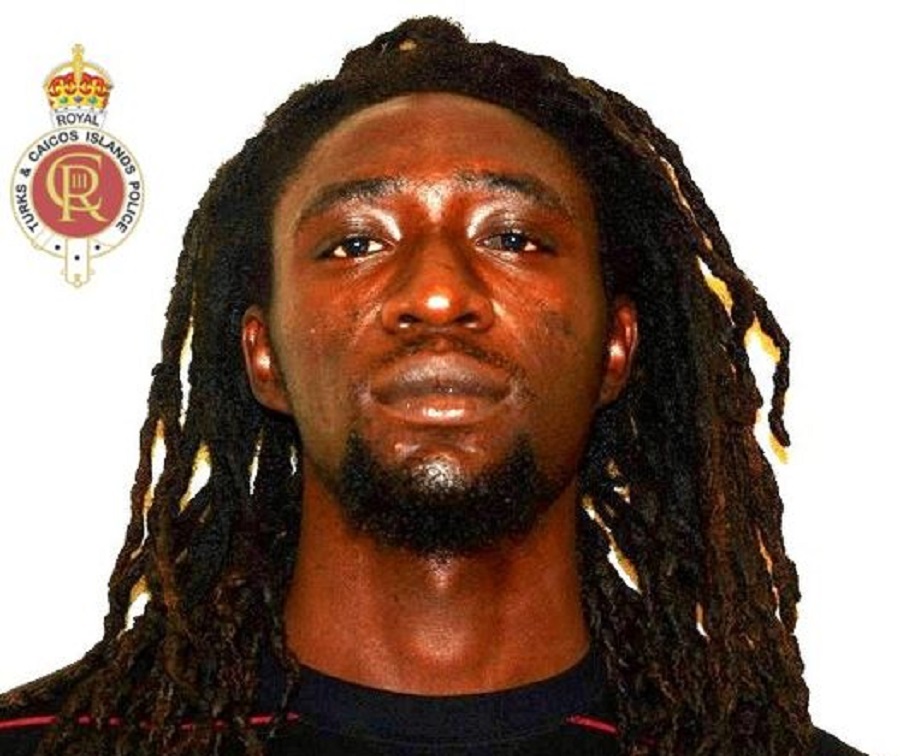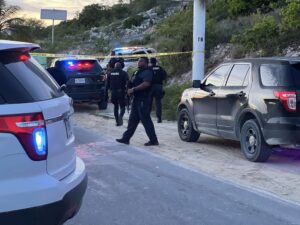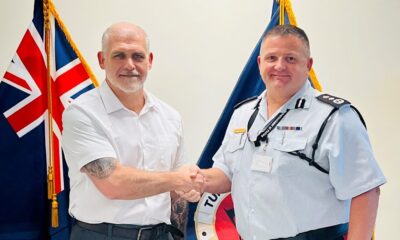News
NEW: Jumilla Isma was Person of Interest, Killers got to him before Police
Published
2 years agoon

Deandrea Hamilton, Dana Malcolm and Wilkie Arthur
Editorial Staff
#TurksandCaicos, November 10, 2023 – Fourteen days before his public execution at the entrance to the Providenciales International Airport the Royal Turks and Caicos Islands Police Force was reportedly searching for Jumilla Isma. Attorneys confirm to Magnetic Media that it was suspicions related to illegal guns and ammunition, including high-powered rifles that put the 24-year-old back on their radar for questioning.
It was also these allegations that led police to lay in wait at the Airport on October 19; reports to our newsroom indicate, they too were alerted about Isma’s attempt to unceremoniously leave the country.
Isma had checked in for a British Airways flight to get out of the Turks and Caicos then left the airport for reasons unknown. Following his slaying, a video was shared of him as he exited the check in terminal at their airport. By the time he was to return, sources tell us, police officers were already stationed, prepared to seize Jumilla Isma on sight in order to take him in for questioning. Before that chance materialised, so-called ‘rivals’ who also learned of the 24-year-old’s whereabouts pounced on the man, shooting him dead in a vehicle along with another, 19-year-old Mike Forbes.
time he was to return, sources tell us, police officers were already stationed, prepared to seize Jumilla Isma on sight in order to take him in for questioning. Before that chance materialised, so-called ‘rivals’ who also learned of the 24-year-old’s whereabouts pounced on the man, shooting him dead in a vehicle along with another, 19-year-old Mike Forbes.
It has led those who knew Isma was a person of interest to TCI Police to surmise that had he been taken in or turned himself over to authorities, he may have been spared that fate.
The gruesome scene was sprawled practically at the airport’s gate, residents tell us, stressing that anyone looking to get in or out would have to pass by the body, the blood and the shot-up car. The killers, who are still at large, sent a third man, who was injured in the melee, scrambling back into the airport lobby soaked in blood as shocked travelers and airport workers looked on.
Isma was no stranger to the law, having been booked for murder multiple times in his short life.
He was charged with the double murder of Tamia Simmons and Stuart Harris – the two were shot to death in a suspected retaliation attack at their Five Cays home in September last year. Simmons, the girlfriend and Harris, the father of a young man wanted on the streets in an ongoing turf war. Isma was exonerated of the homicides in May 2023 because of a lack of evidence.
Prior to that, he had been convicted of the killing of Godly Petiote in 2021 and handed a life sentence but the ruling was overturned. This record may be one of the reasons his death was met with celebration from some residents.
In recent days, videos have emerged of young men spraying champagne and brandishing guns following the gruesome killing of the young man, who had been suspected of involvement in a slew of other crimes.
Despite these concerning videos, police have not yet approached the public with any new information about arrests or suspects in this case. Police have also not revealed why they were so interested in questioning the young man who is of Haitian heritage.
When we reached out to them their response was: “The RTCIPF will not be making any comments at this time.”
Magnetic Media is told Isma was aware he was a person of interest to police yet he decided against cooperating with law enforcers. Instead, his murder is another youth snuffed out in the record setting tally of homicides in ongoing feuds between groups or gangs in the Turks and Caicos Islands.
What sparked this bloody back and forth is unclear, though drugs and profits from its sale have been fingered by authorities. What is certain is that it has forced beefed-up backing from the UK with additional detectives and aircraft imported to bolster expertise and crime fighting capacity.
In 2020, 15 officers were dispatched from the UK including two Superintendents, Lisa Mitcheson, ( Crime and Public Protection) and Martyn Ball (Specialist Operations). Again in 2022, 24 more officers were sent in to form an Anti-Gang Unit. In 2023 Superintendent Dean Holden (Head of Crime, Safeguarding and Public Protection) arrived.
The local government has pumped money into the cause as well. Budgets have continually increased over the past three years from $29 million in 2021/22 to $34 million in 2022/23 and money was allocated for 12 marine officers to be added to the Police Force. In 2023/24 financials revealed the Police got $35.9 million, plus $6.2 million in Capital projects.
three years from $29 million in 2021/22 to $34 million in 2022/23 and money was allocated for 12 marine officers to be added to the Police Force. In 2023/24 financials revealed the Police got $35.9 million, plus $6.2 million in Capital projects.
Since the double murder which marked the 16th and 17th killings for the Turks and Caicos in 2023, there have been threats against a reportedly innocent airport employee who had been accused of taking the video of Isma as he walked out of the terminal after checking in for his flight that fateful Thursday.
There has also been the release of a song which many have described as a group of young men, rhythmically, boldly confessing to the crime. A near 3-minute rap, featuring a variety of voices, well produced, which says among other things that Jumilla Isma or “Ju” thought he could catch a British Airways flight and get away with murders. The artists say they knew their act of getting even would be shocking to the nation, but they did not care and were instead focused only on ‘sending him home’.
Since the murders of Isma and Forbes, which drew condemning comments from government leaders including the Governor, Premier and Opposition party, the Royal TCI Police has kept all official information, including updates under lock and key.
You may like
-


MURDER case of American Deputy Sheriff and South Caicos son is High Priority; No One Arrested Yet
-


CRIME BOSS THE LATE JUMILLO ISMA: NINTH ALLEGED CO-CONSPIRATOR WALKS FREE OF CONSPIRACY CHARGES
-


TCI Man tries to escape major Gun Trafficking case, caught in Provo Airport
-


Domestic Violence Reports are Up in TCI; here’s why
-


Residents React to Airport Road murders
-


Airport worker threatened after Isma and Forbes murders
News
Commonsense, Not Confrontation: Why Kamla Persad-Bissessar Is Right
Published
4 weeks agoon
December 27, 2025
This debate did not start with Donald Trump, and it did not start this month.
For more than a decade, this reporter has had a front-row seat to repeated, urgent calls from across the Caribbean for stronger intervention by the United States in response to gun- and narcotics-fuelled violence that has hollowed out our communities. Long before today’s headlines, leaders warned that transnational gangs were outgunning police, draining public resources and stealing our youngest people.
Much of the public messaging leaned toward calls for fewer guns flowing from the United States, but the practical response from Washington evolved into something else: tactical undergirding of the Caribbean. Training, intelligence sharing, maritime surveillance and joint operations expanded under successive U.S. administrations — Republican and Democrat alike.
Then came Venezuela.
President Nicolás Maduro proved himself an unhinged and destabilising force, openly threatening Guyana’s oil-rich territory and pushing the region to the brink of a conflict no Caribbean state could afford. The United States showed up. The threat of war was blunted. That mattered.
But while geopolitical flames were contained, the narcotics trade exploded.
CARICOM convened emergency meetings on transnational gang violence. Crime became so pervasive that it was formally classified as a public health threat. Entire communities were terrorised. Courts clogged. Police forces stretched beyond capacity.
And now — quietly but noticeably — the tempo has shifted.
While no single forensic study can capture the full picture, it is easily verifiable on the ground that major narcotics busts and trafficking activity have slowed in recent months. Something has changed. Pressure works.
This is the reality Prime Minister Kamla Persad-Bissessar is responding to.
Her critics accuse her of breaking ranks. What she is actually doing is refusing to indulge in strategic hypocrisy — demanding international help to confront narco-terrorism while appearing to defend or excuse the very networks and actors we have spent years condemning.
Sovereignty is not an insult. The Caribbean invokes it constantly. To deny it to the United States — especially when the policies in question were telegraphed months in advance and remain adjustable — is not diplomacy. It is posturing.
What is most troubling is the region’s selective memory. CARICOM has directed months of rhetorical fire at Trump-era policies, yet when disaster struck — from security crises to Hurricane Melissa — the United States remained one of the region’s most reliable supporters. Outcomes matter more than allegiance theatre.
Kamla Persad-Bissessar is not suffering from Trump Derangement Syndrome. She is applying commonsense statecraft. She understands that small states do not gain leverage by moral outrage alone, and that credibility is lost when we appear aligned with individuals, regimes or activities we ourselves have deemed a threat.
Her warning to CARICOM is simple and necessary: do not undermine your own cause.
The Caribbean’s fight against narco-violence, corruption and instability has been long, costly and painful. If pressure is finally producing results, we should be wise enough to recognise it — and brave enough to say so.
Angle by Deandrea Hamilton. Built with ChatGPT (AI). Magnetic Media — CAPTURING LIFE.
News
Beaches Turks and Caicos Showcases and Supports Local Creativity
Published
4 months agoon
September 12, 2025
September 12, 2025
PROVIDENCIALES, Turks & Caicos Islands – The Turks and Caicos Islands are home to a wealth of creativity, from artisans and craft vendors to musicians and performers. Beaches Turks and Caicos, the Caribbean’s leading all-inclusive family resort, has pledged its continued support for these individuals by providing meaningful platforms for them to share their skills and stories with guests from around the world.
The resort’s commitment is most evident in its weekly Cultural Night showcase, where visitors are immersed in the vibrant traditions of the islands. Guests enjoy live performances which feature local music genres such as ripsaw, while artisans display and sell handmade creations. This event not only enriches the guest experience but also strengthens economic opportunities for local entrepreneurs.
Entertainment Division Manager Garett Bailey emphasized the significance of Cultural Night, “we want to showcase everything the Turks and Caicos Islands culture has to offer. Our goal is for guests to leave with a deeper appreciation of the island’s art, music and traditions, while giving local talent the opportunity to share their creativity with visitors from across the globe.”
Beyond Cultural Night, Beaches Turks and Caicos also welcomes local craft vendors onto the resort every Wednesday and Friday where they are offered a direct space to market their goods. Guests have easy access to the Turks and Caicos Cultural Marketplace, where they can purchase authentic local arts and crafts.
where they are offered a direct space to market their goods. Guests have easy access to the Turks and Caicos Cultural Marketplace, where they can purchase authentic local arts and crafts.
Managing Director, James McAnally, highlighted how these initiatives reflect the resort’s broader mission, “we are committed to celebrating and sharing the vibrant culture of these islands with our guests. By showcasing local artistry and music, we not only provide entertainment but also help sustain and grow the creative industries of the Turks and Caicos Islands. From our cultural showcases to nightly live music, we are proud to create authentic connections between our guests and the people of these islands.”
Local musician Keon Hall, who frequently performs at the resort, expressed gratitude for the ongoing partnership, “being able to share my music with Beaches’ guests has created lasting relationships. Some visitors return year after year and request songs from previous performances. This partnership continues to celebrate what we do and strengthens the bond between local artists and the resort.”
The resort’s support of local artisans and entertainers extends beyond business opportunity; it is about preserving heritage and sharing stories. Guests take home more than souvenirs; they leave with experiences that deepen their understanding of Turks and Caicos’ culture and history.
Public Relations Manager, Orville Morgan, noted the importance of this commitment, “for many visitors, these interactions represent their first genuine connection to the Turks and Caicos Islands. From artisans and musicians to farmers and transport operators, our local talent helps shape every guest experience. At Beaches, we are proud to give them the stage to share their stories and their heritage.”
Beaches Turks & Caicos remains dedicated to developing cultural connections and supporting the artisans, musicians and entrepreneurs whose creativity makes the Turks and Caicos Islands unique. Each guest experience is an opportunity to celebrate and sustain the spirit of the islands.
Caribbean News
“Barbecue” is Cooked! US Turns Over 11 Million Haitians into Potential Informants with $5 Million Bounty
Published
5 months agoon
August 12, 2025
August 12, 2025
The United States just set fire to the underworld in Haiti — and this time, the smoke might finally flush out the man many call the most feared in the Caribbean.
On Tuesday, the U.S. government slapped a $5 million bounty on the head of Jimmy “Barbecue” Chérizier, the ex-police officer turned gang boss accused of orchestrating massacres, torching neighborhoods, and strangling Haiti’s capital into chaos. This isn’t just a headline — it’s a full-blown game-changer.
turned gang boss accused of orchestrating massacres, torching neighborhoods, and strangling Haiti’s capital into chaos. This isn’t just a headline — it’s a full-blown game-changer.
That kind of cash — offered under the State Department’s Transnational Organized Crime Rewards Program — is enough to turn the country’s entire population, more than 11 million people, into potential informants overnight. Add the millions in the Haitian diaspora, and Chérizier isn’t just wanted. He’s surrounded.
The Number That Changes Everything
Five million U.S. dollars today equals about 655 million Haitian Gourdes. In a country where many scrape by on less than $5 a day, that’s not just life-changing — it’s life-defining. It’s enough to rebuild homes, put generations through school, or buy a one-way ticket far from the gunfire.
In a place where trust is scarce and survival is everything, that figure is more than tempting — it’s irresistible. For Chérizier, it means every friend could be a future informant, and every loyalist might be calculating the cost of staying loyal.
‘We Will Find Them’ — Jeanine Pirro, U.S. Attorney
Jeanine “Judge Jeanine” Pirro, the U.S. Attorney, set the tone with fire in her voice. “This indictment is the first of its kind,” she announced. “Jimmy Chérizier, also known as ‘Barbecue,’ is a notorious gang leader from Haiti who has orchestrated and committed various acts of violence against Haitians, including the 2018 La Saline attack in which approximately 71 people were killed. He both planned and participated in that massacre.
“Anyone who is giving money to ‘Barbecue’ cannot say, ‘I didn’t know.’ They will be prosecuted, and we will find them. They are supporting an individual who is committing human rights abuses, and we will not look the other way.”
Pirro wasn’t just going after Chérizier. She was sending a warning to the Haitian diaspora accused of feeding his war chest from abroad: the days of claiming ignorance are over.
‘No Safe Haven’ — Darren Cox, FBI
Then came Darren Cox, Deputy Assistant Director of the FBI, delivering the muscle of America’s most powerful investigative force. “There is no safe haven for Chérizier and his network,” Cox declared. “We are closing every link, every cell.” Since January, he said, the FBI has arrested three Top Ten fugitives, taken more than 19,000 criminals off the streets, and seized thousands of tons of narcotics — enough to save millions of lives across the U.S.
The FBI’s Miami and Houston offices have already bagged one of Chérizier’s Viv Ansanm associates inside the United States without firing a shot. “These efforts are a deliberate and coordinated plan,” Cox said, “to protect our communities and confront escalating threats from terrorist organizations like Viv Ansanm.”
‘Three-Year Investigation’ — Ivan Arvelo, HSI
Ivan Arvelo, Assistant Director of Homeland Security Investigations, brought the receipts. “This is the result of a three-year investigation into Chérizier’s procurement networks, cash pipelines, and operational financing that violates sanctions,” he explained. Arvelo described 400 structures destroyed, entire communities erased, and a gang exploiting U.S. dollars, technology, and immigration loopholes to keep its killing machine running. “We tracked how Americans unwittingly bankrolled brutality,” he said — proof that the net is tightening both inside Haiti and abroad.
‘The Worst of the Worst’ — Chris Lambert, State Department
Chris Lambert, representing the State Department’s International Affairs division, gave the political bottom line.
“Mass violence in Haiti must end,” Lambert said. “The instability resulting from Chérizier’s actions fuels illegal migration, regional instability, and transnational crime. We will continue to apply every tool available — including our rewards programs — to stop the spread of unchecked violence, especially to target the worst of the worst criminal leaders threatening the people of our hemisphere.”
instability, and transnational crime. We will continue to apply every tool available — including our rewards programs — to stop the spread of unchecked violence, especially to target the worst of the worst criminal leaders threatening the people of our hemisphere.”
Lambert confirmed what many have long known: Chérizier is not just a gang leader. He commands Viv Ansanm, officially designated in May as a Foreign Terrorist Organization. In the eyes of the U.S., that makes him not just Haiti’s problem — but everyone’s.
Why Haitians May Not Resist
In Haiti, money talks — loudly. And when you put 655 million Gourdes on the table, it shouts.
That’s the kind of figure that turns casual acquaintances into informants and makes even the most hardened loyalist wonder if the payout is worth more than the risk. It’s not a matter of “if” word gets out, it’s a matter of “who will be first to collect.”
For grieving families, it’s a chance at justice. For the desperate, it’s a chance at survival. For Haiti as a whole, it’s hope — wrapped in the most dangerous of temptations.
An Answer to Prayers
For years, Haiti’s headlines have been a scroll of horrors — kidnappings, executions, burned neighborhoods, bodies in the streets. Chérizier’s name has been attached to too many of them.
This move by the U.S. isn’t just strategy. It’s personal. It’s a signal to every Haitian — at home or abroad — that the days of impunity could be ending.
I’ll admit it: when I heard the news, I danced, I sang, and I nearly cried. Not because $5 million is a lot of money, but because of what it means — the possibility, at last, of stopping the man accused of helping turn Haiti into hell on earth.
Four officials, four angles, one mission: Pirro’s fire, Cox’s grit, Arvelo’s precision, Lambert’s conviction. Together, they’ve put the heat on “Barbecue” like never before.
BBQ is cooked. The only question now is: which one of over 11 million potential informants will serve him up?







